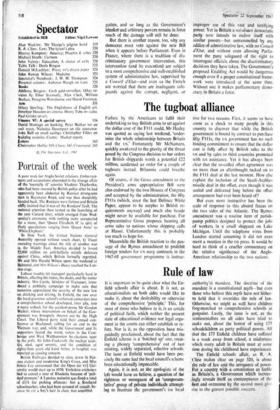Rule of law
It is important to be quite clear what the En- field schools affair is about It is not, as educationalists on both sides would like to make it, about the desirability or otherwise of the comprehensive 'principle.' This, for most of those who believe in it, is an article of political faith, which neither the present state of educational evidence nor legal argu- ment in the courts can either establish or re- fute. Nor is it, as the opposition have mis- guidedly proclaimed, about the fact that the Enfield scheme is a 'botched up' one, creat- ing- a phoney `comprehensive' out of two existing, widely separated, selective schools. The issue at Enfield would have been pre- cisely the same had the local council's scheme been educationally impeccable.
Again, it is not, as the apologists of the left- would have us believe, a question of the rightness or wrongness of an 'unrepresen- tative' group of private individuals attempt- ing to frustrate the government's (or local Authority's) mandate. The doctrine of the mandate is a constitutional myth—but even those who believe this myth have not hither- to held that it overrides the rule of law. Otherwise, we might as well have children frog-marched to comprehensive schools at gunpoint. Lastly, the issue is not, as the sentimentalists on all sides have tried to make out, about the horror of using 177 ,schoolchildren as party political pawns. All that the 177 Enfield children have suffered is a week away from school, a misfortune which every adult in Britain must at some time during his childhood have experienced.
The Enfield schools affair, as R. A. Cline makes clear on page 320, is about the rule of law and the arrogance of power. For a country with a constitution as feeble as Britain's, a Government which increas- ingly reveals itself as contemptuous of the first- and overcome by the second must give rise to the gravest possible concern.


































 Previous page
Previous page